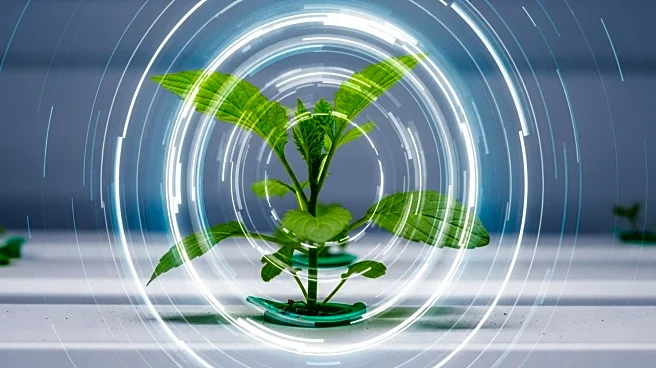What's Happening?
Saline agriculture is emerging as a promising solution to combat soil salinization, a growing problem exacerbated by climate change and improper irrigation practices. This method involves using saline water for irrigation at specific plant growth stages, which helps prevent soil salinity from increasing. Additionally, soil remediation techniques, such as the application of gypsum, are employed to reduce salinity levels. Saline agriculture is particularly suited for arid regions and coastal areas with high soil and groundwater salinity. The approach includes cultivating salt-tolerant crops like asparagus, beets, barley, and rye, which can thrive in high-saline environments. Phytoremediation, using plants to remove saline from the soil, is also gaining traction as a viable method for sustainable farming.
Why It's Important?
The significance of saline agriculture lies in its potential to sustain agricultural productivity in regions affected by high soil salinity. As climate change continues to alter weather patterns, leading to increased droughts and flooding, traditional farming methods face challenges in maintaining crop yields. Saline agriculture offers a sustainable alternative, enabling farmers to grow crops in environments previously deemed unsuitable. This method not only helps preserve the global food system but also supports climate mitigation efforts by utilizing salt-tolerant plants and innovative irrigation techniques. The adoption of saline agriculture could lead to increased food security and economic stability in affected regions.
What's Next?
The future of saline agriculture involves further research and development of techniques like electrodialysis and electrodialysis reversal, which use electric currents to desalinate water. These advancements aim to reduce salt buildup in irrigated soils, enhancing the effectiveness of saline agriculture. As the method gains popularity, collaboration among global organizations is expected to increase, promoting knowledge sharing and technological innovation. Farmers may increasingly adopt saline agriculture practices, focusing on crop selection and environmental management to optimize yields. Continued exploration of phytoremediation and other low-risk methods will likely expand the scope of saline agriculture, making it a cornerstone of sustainable farming.
Beyond the Headlines
Saline agriculture presents ethical and environmental implications, as it encourages the use of natural resources in a sustainable manner. By promoting the cultivation of salt-tolerant crops, it supports biodiversity and the conservation of native plant species. The method also highlights the importance of adapting agricultural practices to changing environmental conditions, fostering resilience in the face of climate change. Long-term, saline agriculture could lead to shifts in global farming strategies, emphasizing the need for innovative solutions to address environmental challenges.









